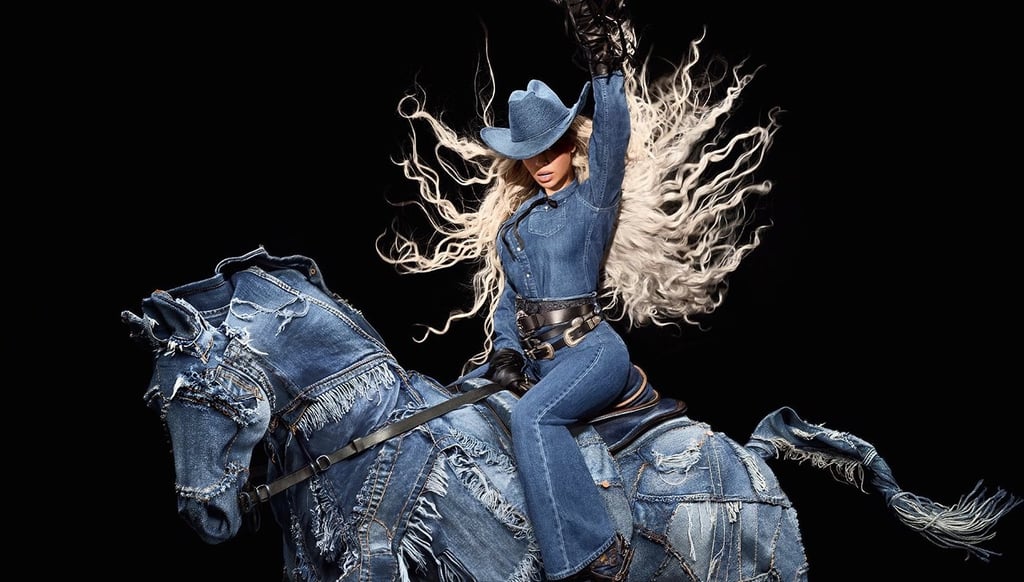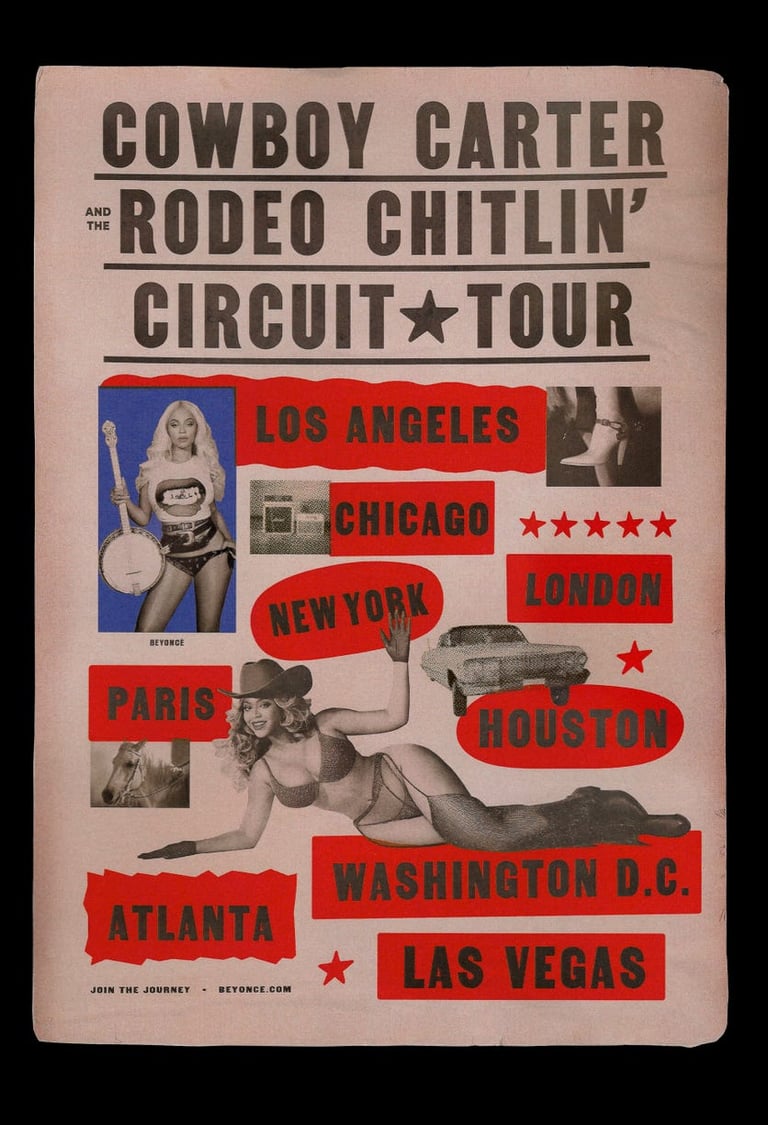Beyoncé’s Cowboy Carter Tour Was a Cultural Reset — And a Long-Overdue History Lesson
When Beyoncé dropped Cowboy Carter, she wasn’t dabbling in country—she was correcting the narrative.
MUSICCULTUREENTERTAINMENTART
Stephanie Davidson
7/30/20254 min read


When Beyoncé dropped Cowboy Carter, she wasn’t dabbling in country—she was correcting the narrative.
And when the Cowboy Carter Tour launched, it became clear: this was more than an album cycle. This was a statement, a reclamation, and a masterclass in cultural ownership.
Now that the tour has come to a close, its full weight is undeniable: Beyoncé didn’t just perform—she made history visible, profitable, and unforgettable.
The Truth Behind the Twang
Country music, often packaged in white Americana, was actually born from the Black South. Before the genre became commercialized and racially gated, its foundation was built on the backs of enslaved Africans who brought the banjo, spirituals, and blues traditions to American soil.
Beyoncé didn’t just acknowledge this history—she embodied it. Cowboy Carter is not an experiment. It is an act of cultural restoration.
The tour brought that message to life. From Black rodeo aesthetics to the deep Southern symbolism in her stage visuals, Beyoncé reframed country music through its original lens: Black, bold, and deeply rooted.
A Commercial Giant with Purpose
The numbers are staggering. The Cowboy Carter Tour grossed over $463 million worldwide. Over 2.8 million fans packed stadiums across continents, making it one of the most successful tours of the decade.
And yet, the real win wasn’t just financial—it was ideological. Beyoncé sold out stadiums by telling the truth. By centering Black Southern culture. By refusing to shrink her identity to fit a genre’s expectation.
She proved what many knew but couldn’t monetize: Black stories sell because they’re powerful—not because they’re palatable.
Rewriting the Country Music Narrative
Since the early 20th century, Black artists in country have been systemically erased, marginalized, or mislabeled. Beyoncé’s decision to feature voices like Linda Martell, the first Black woman to chart in country, was more than homage—it was historical correction.
The industry didn’t always want to remember these names. Beyoncé made sure they were heard.
And she didn’t just tell their stories. She brought them center stage.
The impact of Cowboy Carter on other Black country artists is already being felt. Artists like Mickey Guyton, Reyna Roberts, Brittney Spencer, Allison Russell, and Willie Jones have experienced renewed attention, increased bookings, and rising streams.
For years, these artists navigated a system that excluded them. Beyoncé didn’t just include them—she aligned herself with them, publicly and powerfully. Her success sent a message to the industry:
Black country isn’t a novelty. It’s a necessity.
From Criticism to Cultural Shift
When Beyoncé first performed “Daddy Lessons” at the 2016 CMAs, many questioned her presence. That backlash, steeped in coded racism, served as a preview of how tightly country’s gatekeepers guarded their image.
But this time, Beyoncé didn’t ask permission.
With Cowboy Carter, she wasn’t seeking approval. She was reclaiming what belonged to her lineage—and doing so with clarity, pride, and precision.
Genre is not a gate. It’s a mirror. And Beyoncé forced the world to take a long, hard look.
The Cowboy Carter Tour was not about crossover. It was about correction.
The visuals weren’t for spectacle alone—they were for remembrance. Black cowboys, Black Southern matriarchs, juke joints, horseback baptisms—every image told a story. Every costume, every interlude, every note carried intention.
And behind all of it was a message: we were here. We built this. And we’re not asking—we’re taking our space back.
Let’s not forget the album that sparked it all.
Cowboy Carter debuted at #1 on the Billboard 200
Beyoncé became the first Black woman to top the Hot Country Songs chart with “Texas Hold ’Em”
She broke Spotify records for most first-day streams for a country album by a female artist
Beyoncé didn’t just show up—she dominated. And she did it while holding the door wide open for others.
She created a new blueprint: you don’t have to assimilate to be accepted. You have to tell the truth—and trust that it will resonate.
A Legacy Already Etched
Now that the tour has ended, the moment becomes a movement.
Beyoncé’s work on Cowboy Carter has permanently shifted how we talk about race, genre, and history in music. The ripple effect will continue—through the artists she empowered, the fans she educated, and the institutions she challenged.
In the end, this was not just a musical moment. It was a cultural reckoning.
The Cowboy Carter Tour made one thing clear: Beyoncé didn’t enter country to fit in—she came to remind the world that Black voices have always been the foundation.
She did what the genre wouldn’t do on its own: tell the full story.
And now, that story is louder, richer, and more honest than it’s ever been.








